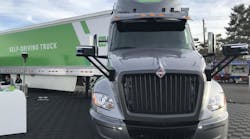The effect of automation on drivers is clearly overstated, according to two Department of Labor officials, but their research doesn’t give any estimation on how many drivers will lose their jobs because of the coming technology.
"In some of the studies, the researchers are not looking at it from the drivers' perspective," said Kristen Monaco, co-author of the study Trucking Driving Jobs: Are They Headed for Rapid Elimination? She also blames the media for hyping drivers' fears.
Monaco is associate commissioner for compensation and working conditions for the U.S. Bureau of Labor Statistics (BLS). (The study, co-authored by Maury Gittleman,
notes that their findings do not necessarily reflect government views or policies.)
Monaco cannot quantify how many drivers will lose their jobs.
"First, the number of drivers who could be affected is not 2 to 3 million like you often see in the media, but I cannot tell you exactly how many," she told Fleet Owner. However, she says that the area most in jeopardy of being automated is long-haul of which there are 300,000 to 400,000 drivers, which is a much lower number than 2 to 3 million.
She also calls into question how BLS classifies the universe of truck drivers. For example, they are included in the group of sales workers who are on the road selling and taking orders, she notes. Total truck driver numbers are also inflated because light truck delivery trucks are included in the number, too.
In addition, Monaco said that some researchers and experts err when they parse their estimates by using the total number of CDL holders even though many of these licensees no longer drive.
She also says that automation numbers are inflated by those who don't take into account that drivers do other jobs that cannot be automated like pre-check inspections, tarping, fueling, and loading and unloading.
"Drivers do a lot of jobs other than drive," she said. "And those still need to get done, and those really are the trickiest things to automate."
Monaco noted another overlooked, but positive effect of automation is that it could produce more driver jobs. As long haul jobs become automated, she said, delivering cargo becomes less expensive, leading to more haulage, and more jobs for last-mile drivers.
Monaco and her co-author offer some reassurance to drivers concerned about losing their jobs to automation. They conclude in their study:
"Fears that new technology will lead to massive unemployment are not new, though many researchers contend that this time the outcome will differ because of the potentially powerful effects of computers, robots, and other digital technologies. While we have not tried to address the question of what will happen to employment in the economy as a whole, we have examined an important occupation, and one in which employment levels many predict will be hit hard in the not-too-distant future by technologies that were difficult to foresee as recently as a decade or two ago.
“Our case study of truck drivers suggest, however, that, at least for now, any loss of jobs as a result of automation will be more limited, especially compared with journalistic accounts but also as anticipated by a number of experts."



